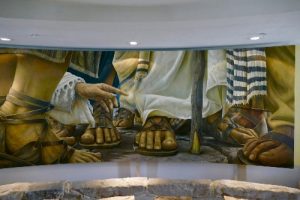HOMILY WEEK 14 01 – Year I
Trust, Tithing, and Transformation:
(Gen 28:10-22; Ps 91; Mt 9:18-26)
****************************************
A hundred-dollar bill, a twenty-dollar bill and a Loony were having a serious conversation about life one day. The hundred-dollar bill said that it had a very good life – it had been on a few cruises and holidays at exotic resorts. The twenty-dollar bill shared it had a pretty good life too – it had been to a few operas and lots of fancy restaurants. The Looney said, “Boy, I envy you guys. All I get to do is go to church, church, church!”
Today’s readings offer us three aspects of a lively faith: trust, tithing and transformation.
Regarding trust, the Psalm response is clear: “In you, my God, I place my trust.” Step 3 of the 12 Step program is all about trust as well: “Surrendered our life and our will to the care of God as we understood God.” Michelle is an example of trust: When her ex-husband refused to provide child support and she lost her job, she was tempted to despair, but decided to trust that God would provide, and God did. Her ex was located and forced to pay the $6,000 he owed her.
In the first reading, Jacob has a dream which bridges heaven and earth, and in which God actually speaks to him. That dream was a spiritual high for Jacob. His exclamation that “this is none other than the house of God, and this is the gate of heaven” reminds me of the church in Delmas, my home parish. As a child, I would read those word written in large letters on each side of the church above the pillars holding up the roof.
Jacob ritualizes his experience with oil and a stone pillar, and committed himself to tithing a tenth “of all that God will give to him.” We Catholics are poor at this. Even 1/40th of a wage put in the collection plate on a Sunday would eliminate any need to resort to addictive activity like bingo or casinos. This reading has inspired me to tithe my earnings, and also my time – a tenth of my day is now spent in one form of prayer or another, something that gives me great peace.

Touching the hem of Christ (at Magdala)
The third element, transformation, is central to the gospel account in which Jesus restores life to a young girl, and health to a sick woman. Both the girl and the woman are barren – the girl before puberty, the elder unclean and unable to give life. By healing this unclean woman, Jesus implicitly puts an end to the ritual code of Leviticus. The identity of the new Israel, the Church, would not be through ritual behaviours but through imitation of him. In the end, Jesus touches both with healing and restores their life and potential. He can do so for us when we trust in him and perhaps tithe our lives.
These readings bring to mind a quote from the Big Book of AA: “Their sobriety was transcended by the happiness they found in giving themselves for others. They shared their homes, their slender resources, and gladly devoted their spare hours to their fellow sufferers. They were willing, by day or night, to place a new candidate in the hospital and visit him afterward. They grew in numbers. They experienced a few distressing failures, but in those cases, they made an effort to bring the person’s family into a spiritual way of living, thus relieving much worry and suffering.”
Doesn’t that sound like the early Church? It goes on: “A year and six months later, these three original members had succeeded with seven more. Seeing much of each other, scarce an evening passed that someone’s home did not shelter a little gathering of men and women, happy in their release, and constantly thinking how they might present their discovery to some newcomer.”
The Eucharist brings together all three elements of the readings. It is a profound act of faith; an invitation to tithe, and certainly transformative as we receive the body and blood of Jesus, and are ourselves transformed into his body.
So – try exercising the three components of a strong, active faith – total trust in God, expressing that trust through tithing our time, treasure and talent, and experiencing inner transformation of our whole being.



